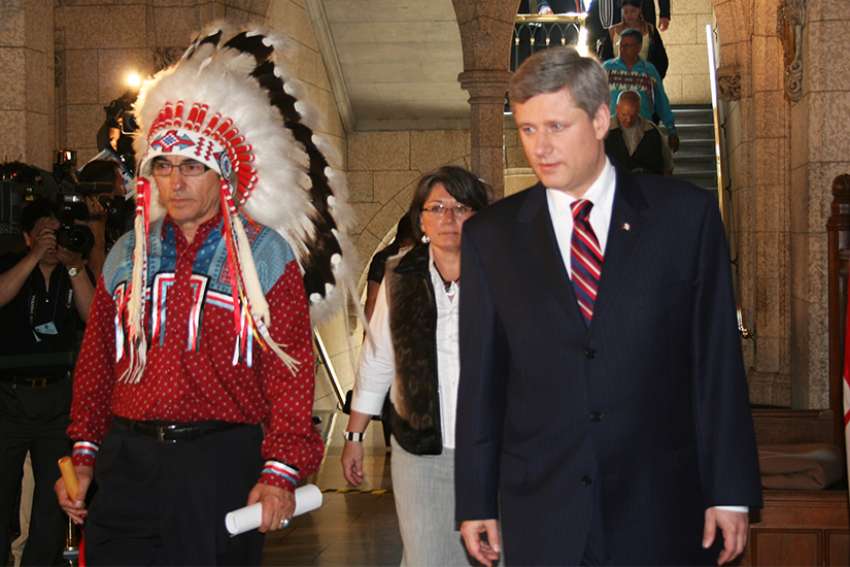The Grouard-McLennan archbishop watched from the gallery of the House of Commons on June 11, 2008 as Harper made the historic apology, and as the leaders of the Opposition parties followed suit. Then the Assembly of First Nations National Chief Phil Fontaine responded, as did Inuit and Metis leaders.
“You came away from it saying this felt very good, not only for Indigenous people in Canada, but good for Canada,” Pettipas recalled.
Despite the sense of a page turning 10 years ago, “it wasn’t like everything changed,” the Alberta archbishop said. “I think we have to bear this in mind.”
The legacy of the residential schools is only “one chapter in the story of the relations between Indigenous and non-Indigenous peoples since contact,” he said, reflecting on the 10 years since the apology. “There’s a larger story than that here.
“I think this is going to be a long struggle in Canada, despite the apologies, and the statements meant to improve the relationship,” he said. “I think there’s still a lot to have to happen in Canada.
“In religious terms, I think there’s a call for conversion here,” he said. “I think the people of Canada, both Indigenous and non-Indigenous, we need a change of heart; we need to be converted and work at this a long time.”
Later in 2008, the archbishop also had a close-up view of the start of the Truth and Reconciliation Commission (TRC), which ran until it released its final report in December 2015.
“Since the TRC, since the apology, there have been wonderful things,” he said. “A lot of Canada has ‘got it’ but there’s a long way to go.”
Ordained to the episcopacy in January 2007, Pettipas took leadership of a diocese that ran six residential schools and included 19 First Nations. Until then, he had had little experience or exposure to the issues of Canada’s Indigenous peoples. He soon became president of the Corporation of Catholic Entities Party to the Indian Residential Schools Settlement Agreement (IRSSA) that included the 50 dioceses and religious orders that ran residential schools. “I couldn’t believe I was asked to do this,” the archbishop said. “I was just coming on board and I knew less than anybody.”
Since the Catholic Church has no central structure, the groups were asked by the court to form a corporation to more effectively participate in the IRSSA, which came into effect in September 2007 as the largest class action lawsuit in Canadian history.
His role as president of the Catholic Entities enabled him to attend the Harper apology, and attend many of the public TRC events.
“I was honoured to be part of the whole process, even though at times it was difficult to listen to the stories, the agony of this. To be there, to be engaged and present to it, I consider in many ways to be a blessing,” he said.
In conversations with both Indigenous and non-Indigenous, he still encounters feelings of frustration.
“It’s still a wounded relationship. It’s still broken and maybe it will never be truly fixed,” he said.
Ten years after the Harper apology, the focus is on the TRC’s Call to Action #58 asking for a papal apology on Canadian soil.
Pettipas objects to the way some media have positioned it “that the Pope refuses to apologize.”
“It sounds very obstinate,” he said. “That’s not the spirit of Pope Francis. We have to give him the benefit of the doubt. We know what his spirit is. We know he is not averse to offering apologies.
“There is a certain political agenda to this stuff and maybe this is what the Holy Father is trying to avoid,” the archbishop said.
The archbishop said one of the things Senator Murray Sinclair, the chair of the TRC, used to ask was: “What does reconciliation look like to you?”
“My constant answer was, ‘It’s about relationships, about respectful, healthy relationships between Indigenous and non-Indigenous peoples,” Pettipas said.
The archbishop is seeing this “happen more and more.”
He recently visited the northern-most deanery in his diocese and had “a very fine meeting with the new chief and council. “There was a sense at the table, this was a conversation like we’ve never had before,” Pettipas said. “This is good. This is one experience and one example of what I think is possible in terms of new relations between Indigenous and non-Indigenous peoples.”

